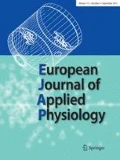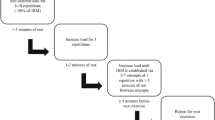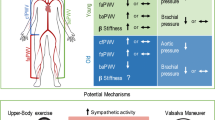Abstract
Although high-intensity resistance training increases central arterial stiffness, moderate-intensity resistance training does not. However, the effects of low-intensity resistance training on arterial stiffness are unknown. The aim of this study was to investigate the effect of low-intensity resistance training with short inter-set rest period (LSR) on arterial stiffness. Twenty-six young healthy subjects were randomly assigned to training (10 males, 3 females) and control groups (9 males, 4 females). The subjects performed LSR twice a week at 50% of one repetition maximum for 10 weeks. Training consisted of five sets of ten repetitions with an inter-set rest period of 30 s. Changes in brachial-ankle pulse wave velocity (baPWV) and brachial flow-mediated dilation (FMD) were assessed before and after the intervention period. After the intervention period, one repetition maximum strength increased (by 9–38%, P < 0.05 to <0.001; increases varied among the exercise types), baPWV decreased (from 1,093 ± 148 to 1,020 ± 128 cm/s, P < 0.05), and brachial FMD increased (from 9.7 ± 1.3 to 11.8 ± 1.9%, P < 0.05). These values did not change in the control group. These results suggest that LSR reduced arterial stiffness and improved vascular endothelial function.

Similar content being viewed by others
References
Asmar R (1999) Factor influencing pulse wave velocity. In: Asmar R (ed) Arterial stiffness and pulse wave velocity. Elsevier, Amsterdam, pp 57–88
Berg BR, Cohen KD, Sarelius IH (1997) Direct coupling between blood flow and metabolism at the capillary level in striated muscle. Am J Physiol Heart Circ Physiol 272:H2693–H2700
Bonde-Petersen F, Mork AL, Nielsen E (1975) Local muscle blood flow and sustained contractions of human arm and back muscles. Eur J Appl Physiol 34:43–50
Cameron JD, Dart AM (1994) Exercise training increases total systemic arterial compliance in humans. Am J Physiol 266:H693–H701
Corretti MC, Anderson TJ, Benjamin EJ, Celermajer D, Charbonneau F, Creager MA, Deanfield J, Drexler H, Gerhard-Herman M, Herrington D, Vallance P, Vita J, Vogel R (2002) Guidelines for the ultrasound assessment of endothelial-dependent flow-mediated vasodilation of the brachial artery: a report of the International Brachial Artery Reactivity Task Force. J Am Coll Cardiol 39:257–265
Cortez-Cooper MY, DeVan AE, Anton MM, Farrar RP, Beckwith KA, Todd JS, Tanaka H (2005) Effects of high intensity resistance training on arterial stiffness and wave reflection in women. Am J Hypertens 18:930–934
Cortez-Cooper MY, Anton MM, Devan AE, Neidre DB, Cook JN, Tanaka H (2008) The effects of strength training on central arterial compliance in middle-aged and older adults. Eur J Cardiovasc Prev Rehabil 15:149–155
Eves ND, Plotnikoff RC (2006) Resistance training and type 2 diabetes: considerations for implementation at the population level. Diabetes Care 29:1933–1941
Heffernan KS, Edwards DG, Rossow L, Jae SY, Fernhall B (2007) External mechanical compression reduces regional arterial stiffness. Eur J Appl Physiol 101:735–741
Korthuis RJ, Granger DN, Townsley MI, Taylor AE (1985) The role of oxygen-derived free radicals in ischemia-induced increases in canine skeletal muscle vascular permeability. Circ Res 57:599–609
London GM, Guerin AP (1999) Influence of arterial pulse and reflected waves on blood pressure and cardiac function. Am Heart J 138:220–224
Madden KM, Lockhart C, Cuff D, Potter TF, Meneilly GS (2009) Short-term aerobic exercise reduces arterial stiffness in older adults with type 2 diabetes, hypertension, and hypercholesterolemia. Diabetes Care 32:1531–1535
Mark AL (1996) The sympathetic nervous system in hypertension: a potential long-term regulator of arterial pressure. J Hypertens 14:S159–S165
McDonagh MJ, Davies CT (1984) Adaptive response of mammalian skeletal muscle to exercise with high loads. Eur J Appl Physiol Occup Physiol 52:139–155
Mitchell JH, Payne FC, Saltin B, Schibye B (1980) The role of muscle mass in the cardiovascular response to static contractions. J Physiol 309:45–54
Miyachi M, Kawano H, Sugawara J, Takahashi K, Hayashi K, Yamazaki K, Tabata I, Tanaka H (2004) Unfavorable effects of resistance training on central arterial compliance: a randomized intervention study. Circulation 110:2858–2863
Ohwada T, Saito T, Saitoh S, Osugi T, Ohtake A, Maehara K, Ishibashi T, Maruyama Y (2006) Specificity of vascular reactivity and remodeling after repeated endothelial injury in a swine model. Int Heart J 47:297–310
Okamoto T, Masuhara M, Ikuta K (2006) Effects of eccentric and concentric resistance training on arterial stiffness. J Hum Hypertens 20:348–354
Okamoto T, Masuhara M, Ikuta K (2008) Effects of low-intensity resistance training with slow lifting and lowering on vascular function. J Hum Hypertens 22:509–511
Okamoto T, Masuhara M, Ikuta K (2009a) Low-intensity resistance exercise with slow lifting and lowering does not increase noradrenalin and cardiovascular responses. Clin Physiol Funct Imaging 29:32–37
Okamoto T, Masuhara M, Ikuta K (2009b) Effects of muscle contraction timing during resistance training on vascular function. J Hum Hypertens 23:470–478
Pollock ML, Franklin BA, Balady GJ, Chaitman BL, Fleg JL, Fletcher B, Limacher M, Piña IL, Stein RA, Williams M, Bazzarre T (2000) AHA Science Advisory. Resistance exercise in individuals with and without cardiovascular disease: benefits, rationale, safety, and prescription: An advisory from the Committee on Exercise, Rehabilitation, and Prevention, Council on Clinical Cardiology, American Heart Association; Position paper endorsed by the American College of Sports Medicine. Circulation 101:828–833
Seals DR (2003) Habitual exercise and the age-associated decline in large artery compliance. Exerc Sport Sci Rev 31:68–72
Stewart KJ, Bacher AC, Turner K, Lim JG, Hees PS, Shapiro EP, Tayback M, Ouyang P (2005) Exercise and risk factors associated with metabolic syndrome in older adults. Am J Prev Med 28:9–18
Takarada Y, Ishii N (2002) Effects of low-intensity resistance exercise with short interset rest period on muscular function in middle-aged women. J Strength Cond Res 16:123–128
Takarada Y, Takazawa H, Sato Y, Takebayashi S, Tanaka Y, Ishii N (2000) Effects of resistance exercise combined with moderate vascular occlusion on muscular function in humans. J Appl Physiol 88:2097–2106
Tanimoto M, Ishii N (2006) Effects of low-intensity resistance exercise with slow movement and tonic force generation on muscular function in young men. J Appl Physiol 100:1150–1157
Wilkinson IB, Franklin SS, Cockcroft JR (2004) Nitric oxide and the regulation of large artery stiffness: from physiology to pharmacology. Hypertension 44:112–116
Woodman RJ, Playford DA, Watts GF, Cheetham C, Reed C, Taylor RR, Puddey IB, Beilin LJ, Burke V, Mori TA, Green D (2001) Improved analysis of brachial artery ultrasound using a novel edge-detection software system. J Appl Physiol 91:929–937
Yoshizawa M, Maeda S, Miyaki A, Misono M, Saito Y, Tanabe K, Kuno S, Ajisaka R (2009) Effect of 12 weeks of moderate-intensity resistance training on arterial stiffness: a randomised controlled trial in women aged 32–59 years. Br J Sports Med 43:615–618
Acknowledgment
This research was supported by the Grant-in-Aid for Scientists Research from the Ministry of Education, Culture, Sports, Science and Technology of Japan (21700680).
Author information
Authors and Affiliations
Corresponding author
Additional information
Communicated by Niels Secher.
Rights and permissions
About this article
Cite this article
Okamoto, T., Masuhara, M. & Ikuta, K. Effect of low-intensity resistance training on arterial function. Eur J Appl Physiol 111, 743–748 (2011). https://doi.org/10.1007/s00421-010-1702-5
Accepted:
Published:
Issue Date:
DOI: https://doi.org/10.1007/s00421-010-1702-5




